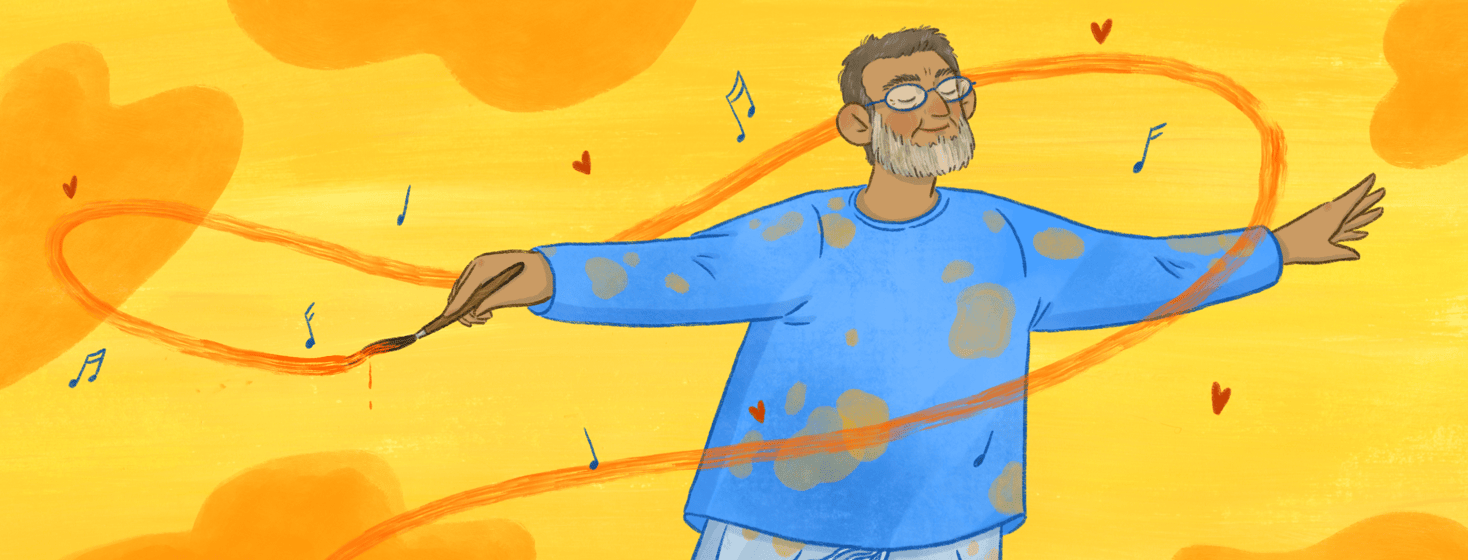Music and Art Therapy for Alzheimer's and Dementia
Alzheimer’s disease is a brain disorder. It affects memory, thinking, and learning and is the most common form of dementia. Symptoms worsen over time. Eventually, they impact your ability to carry out daily tasks. About 6.5 million Americans aged 65 and older are living with Alzheimer's.1,2
There is no cure for Alzheimer’s. But there may be ways to slow it down and ease its symptoms. These include non-drug treatments along with standard medical care. Art and music therapy can help some people with Alzheimer’s with their memory, behavior, and more.1
What are music and art therapy?
Music therapy uses music to help a person achieve health goals. These goals could be lowering stress or boosting mood. Art therapy uses art to treat mind and behavior problems. Both therapies use creative activities with the aim of improving:3,4
- Thinking
- Emotions
- Quality of life
What happens in a music or art therapy session?
Music and art therapy sessions can be held in groups or individually. They take place in:
- Nursing homes
- Hospitals
- Clinics
- Other settings
During a music therapy session, you or your loved one with Alzheimer’s will listen, sing, play, or move to the music. The therapist might guide participants to make music of their own. Similarly, an art therapist will use drawing, painting, or other media to allow people with Alzheimer’s to express themselves and connect with others. Producing art also gives them a chance to use their remaining visual and motor abilities.1,3,5
No prior experience with art or music is needed.
Impact on Alzheimer’s and dementia symptoms
Music and art therapy may have positive effects in many areas, including:1,5-7
- Memory: Familiar music can bring up personal emotions and memories for people with Alzheimer’s and dementia. They may remember the melodies or titles of songs they once knew. They may also recognize the way the music makes them feel. In one study, older adults reduced memory problems after listening to relaxing classical music daily. Likewise, painting and drawing can give people with Alzheimer’s an outlet to recall and share memories.
- Behavior: People with Alzheimer’s may sometimes act verbally or physically aggressive. They may also express a lack of interest in activities they used to enjoy. Studies suggest that music and art therapy may have a calming effect and help reduce agitation.
- Language: People with Alzheimer’s may lose the ability to speak in ways that other people can understand. Music and art therapy may help them communicate more smoothly and clearly.
- Mood: Alzheimer’s can lead to mood swings, anxiety, and depression. This may be linked to increased levels of the stress hormone cortisol. Music and art therapy have been shown to lower these symptoms. These therapies can also ease feelings of isolation. For some, they may reduce the need for psychiatric drugs.
More studies are needed to show long-term improvements in these areas. However, experts agree that music and art therapy are safe and potentially beneficial. These therapies can provide moments of joy, calm, and hope in the face of this difficult disease.1,7
Learning more about music and art therapy
If you are interested in art or music therapy for yourself or a loved one with Alzheimer’s, talk to your doctor. These therapies may be offered at your healthcare facility or a nearby location. Insurance, community grants, or other funds may help to cover therapy costs. You may need to pay the therapist out-of-pocket. Your healthcare team can give you more information and help you find a therapy program that is right for you.3

Join the conversation